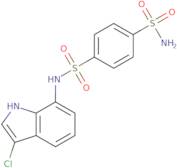Indisulam
CAS: 165668-41-7
Rif. 3D-QGA66841
| 1mg | Fuori produzione | ||
| 2mg | Fuori produzione | ||
| 5mg | Fuori produzione | ||
| 10mg | Fuori produzione | ||
| 25mg | Fuori produzione | ||
| 250mg | Fuori produzione |
Informazioni sul prodotto
- 1,4-Benzenedisulfonamide, N-(3-chloro-1H-indol-7-yl)-
- 1,4-Benzenedisulfonamide, N<sup>1</sup>-(3-chloro-1H-indol-7-yl)-
- E 7070
- N-(3-Chloro-1H-indol-7-yl)-1,4-benzenedisulfonamide
- N-(3-chloro-1H-indol-7-yl)benzene-1,4-disulfonamide
- N<sup>1</sup>-(3-Chloro-1H-indol-7-yl)-1,4-benzenedisulfonamide
- 1,4-Benzenedisulfonamide, N1-(3-chloro-1H-indol-7-yl)-
- N1-(3-Chloro-1H-indol-7-yl)-1,4-benzenedisulfonamide
Indisulam is a potent cytotoxic agent that induces cell lysis. It binds to the thiol groups on cellular proteins, thereby inhibiting energy metabolism and preventing the synthesis of DNA, RNA, and protein. This results in cell death by apoptosis or necrosis. Indisulam has been shown to have inhibitory properties against solid tumours in animal models and may be used as a potential biomarker for cancerous cells. The antitumor activity of indisulam is thought to be due to its ability to bind nitrogen atoms found in many proteins with high affinity. It has been shown that the binding of indisulam with these nitrogen atoms inhibits their function and leads to cell death (e.g., inhibition of protein synthesis).





